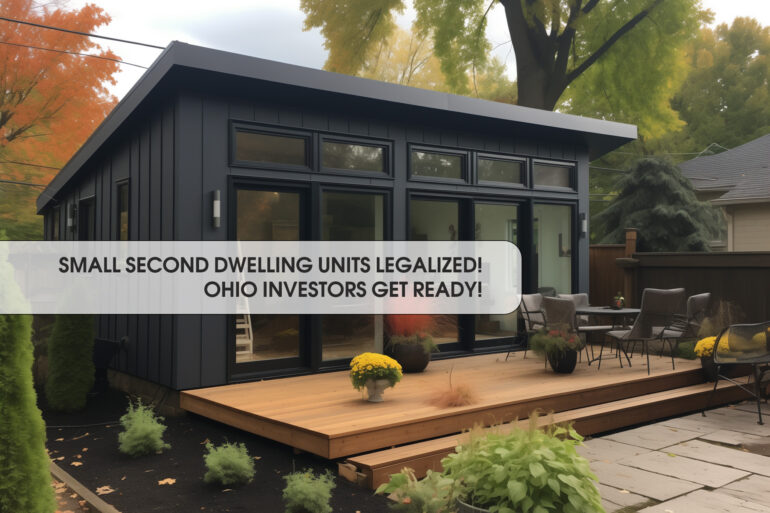Accessory Dwelling Units (ADUs); Opportunity for Ohio Investors?
The Cincinnati City Council recently modified the zoning provisions to permit the construction and use of Accessory Dwelling Units (ADUs) in residential settings. Do ADUs represent a viable supplementary or auxiliary opportunity for ambitious real estate investors?
Located in the southwestern corner of Ohio near the Kentucky border, Cincinnati is the state’s third most populous city and is the first to formally permit ADUs. In recent years, city leaders have continued looking for new ways to create affordable housing that may benefit seniors and those with disabilities while also helping existing homeowners offset rising property taxes.
The city council defines Accessory Dwelling Units as additional, secondary housing units located on the property of a single-family home. Informally, ADUs are often referred to as “granny flats” or “mother-in-law suites.”
Possible Configurations and Amenities
ADUs must be independent, self-contained, and permanent housing units with a separate entrance, kitchen or kitchenette, bathroom, and bedroom. Some of the most common configurations are:
- Detached, standalone structures are usually located behind or beside the primary home.
- Attached, or “add-on” structures.
- Interior units on the home’s upper or lower level.
- Units located above a detached or attached garage.
- Garages that are fully converted to housing units.
Those with aging parents might consider an ADU as an economical alternative to assisted living.
Requirements and Limitations
Only one ADU is permitted per lot. The property owner or a designee (responsible party) must occupy the main home for more than 75% of the year. Also, owners of ADUs must complete some basic training regarding fair housing laws, creating rental agreements, and landlord best practices.
What is a “Designee” or “Responsible Person”?
Because of the owner occupancy requirement, some prospective real estate investors are deterred from considering ADUs, as they have no intention of residing in the primary home. However, the Cincinnati Municipal Code also allows for the owner to “designate a responsible person” who will reside in the primary single-family home instead.
Under CMC § 1421-06(l)(4)(ii), a “responsible person” is assigned by the owner who assumes the duty, financial responsibility, and authority to “operate, maintain, and manage” all dwelling on the lot. Based on the city’s provisions, a real estate investor who will not be occupying the primary home might consider naming (designating) an individual to assume this role as an onsite property manager.
Potential Concerns and Challenges
City leaders, local agencies, and neighborhood residents commonly express concern regarding the following:
- Worsening problems in neighborhoods that already struggle with insufficient on-street parking.
- Units being used for short-term rentals, which often house tenants who are a nuisance.
- Feelings of diminished privacy among occupants of adjacent homes
- Newly constructed or modified ADUs might alter the character of the neighborhood.
Possible Benefits for Real Estate Investors
A real estate investor might consider exploring ADUs for a host of potential reasons.
Opportunity to Generate Rental Income on Primary Residence
ADUs represent an opportunity for homeowners to use their primary residence to generate income that will partially offset their home mortgage expenses. Those without a mortgage on their primary home could generate an additional rental income stream.
In Cincinnati, the current provisions require the owner of the unit to occupy the main home; however, investors might explore other markets for opportunities to construct ADUs as secondary rentals with their existing rental properties.
Diversify Investment Portfolio
ADUs are yet another opportunity for real estate investors to diversify, which has traditionally been encouraged.
Another reason why investors might consider exploring ADUs is that the concept and opportunities are still evolving.
Venture into a New Niche in an Emerging Market
With Cincinnati being the first city in Ohio to permit ADUs, we might be at the precipice of a popular trend that will soon extend into Columbus, Dayton, and other cities. Investors might capitalize on this opportunity to explore this new niche.
Using an ADU as an Airbnb
Using an ADU as a short-term rental (STR) is another potentially lucrative option. Data from NerdWallet shows that the median rate for a one-night stay in an Airbnb is approximately $314. The median daily rate is roughly $213 for weekly short-term rentals ($1,491 total).
Across the county, Airbnb rentals have demonstrated an ability to generate significantly higher rental income in comparison to more traditional 12-month leasing arrangements. In recent years, most Ohio cities have implemented licensing and tax requirements. For example, Cincinnati imposes a 7% Short Term Rental Tax.
A Cost-Effective Alternative Amid Challenging Market Conditions
In the Cincinnati region, the average home sales price for September 2023 was 6.1% higher, which equates to an increase of roughly $13,900, over September of 2022. In this highly-priced market, savvy investors might consider an ADU as a smart alternative. Keep in mind that buyers are also currently facing sky-high mortgage interest rates, which makes ADUs a viable alternative for the near future.
A Home for Aging Parents
Those with aging parents might consider an ADU as an economical alternative to assisted living. Current estimates for assisted living in the Midwestern U.S. range from $3,500 to $8,000 per month ($42,000 to $96,000 annually). For those whose parents have limited resources, an ADU might offer tremendous savings.
How to Pay for an ADU?
Data from Experian suggests that roughly 62% of homeowners finance ADUs with savings or other assets that are easily convertible into cash without incurring penalties. Others use home equity loans, home equity lines of credit (HELOCs), cash-out refinancing, or home construction loans.
Ongoing Costs Involved
As with any property, investors will have some ongoing expenses with an ADU. Examples include additional property taxes, homeowner’s insurance, utilities, and maintenance costs.
ADUs are a potentially worthwhile opportunity for those in the realm of rental property investing in Ohio.
ADUs as Separate Properties?
Another reason why investors might consider exploring ADUs is that the concept and opportunities are still evolving. For example, California has an Assembly Bill 1033, which essentially treats ADUs as separate or standalone condominiums.
Mortgage lenders in California explain that the buying and selling of ADUs will soon be viewed similarly to “traditional” real estate transactions.
Federal Financing Initiatives on The Horizon
Further evidence of the opportunities associated with ADUs is emerging at the federal level. Recent changes by the Federal Housing Administration (FHA) allow Fannie Mae, Freddie Mac, and other federally insured programs to consider future rental income from an ADU when making lending decisions. Keep in mind that new standards that are implemented by Fannie and Freddie often become the norm, as other lenders soon follow suit.
Should Ohio Real Estate Investors Assess ADUs?
For many of the above reasons, ADUs are a potentially worthwhile opportunity for those in the realm of rental property investing in Ohio. Cincinnati is the first major city in the state to allow them, yet it is safe to assume that Cleveland, Columbus, Dayton, and others will monitor and assess ADUs for themselves.








